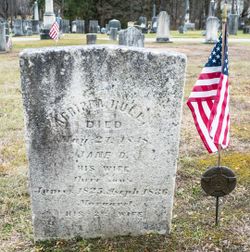At the start of the American Revolutionary War that eventually led to the independence of America from the British, Agrippa Hull was a young black teenager who was lucky to be born free thus live and fend for himself.
Born on March 7, 1759, to parents who were enslaved in Northhampton Massachusetts, his father is believed to be an African prince from West Africa who died when Agrippa was still a young child. His parents were strong Christians who raise their kids in the faith.
After the death of his father, Agrippa’s mother sent him to Stockbridge in Berkshire Hills in western Massachusetts to live with a free black family willing to look after him through links with the church. Agrippa grew up with the Stockbridge Indians learning to read and write.
Agrippa was a strong and well built young man. Shortly after his 18th birthday in 1777 and 2 years after the start of the Revolutionary War, Agrippa was enlisted into the American army to help the Americans fight the British. He became one of the very few black people fighting for America under George Washington.
Several enslaved Africans who were given the chance to fight in the war opted to fight for the British with hopes of gaining their freedom. The British were the landowners, plantation masters as well as traders
Agrippa served until the end of the war in 1783. During his service in the war, he was first assigned to General John Paterson who he fought with and witnessed by British General John Burgoyne in New York. He was also part of the 1778 battle in New Jersy in that same year.

In 1779 after George Washington had gained the help of Polish military engineer, statesman and military leader Tadeusz Kościuszko, he personally assigned Agrippa to the polish military man who played a huge role in the war. Working with Tadeusz Kościuszko until the end of the war, he first worked as an attendant and messenger slowly rising to fight in a few wars himself and serve as a medical assistant saving the lives of several wounded soldiers.
While serving in the war, Agrippa saw for himself the conditions of enslaved Africans and felt a need to help in the fight to abolish slavery after the war ended. He was lucky not to experience any form of harsh treatment as he was highly respected and treated well in the army and was paid for his service to the country even during the six years he worked with the army.
Two years before the end of the war in 1779, Agrippa was trained by doctors and learnt how to conduct simple operations such as removal of bullets, fixing of broken bones and amputation of body parts.
At the end of the war, for his hard work and dedication, Agrippa Hull was paid by the army and also received a special veteran’s pension specifically given and signed by the then president of America, George Washington, which he received.

Coming out of the war with a whole new perspective and some money, Agrippa moved back to his home in Stockbridge Massachusetts, where he bought lands and became the largest landowner. He worked as a minder to Theodore Sedgwick, a lawyer who would later defend Elizabeth Freeman (Mum Bett) to become the first enslaved person to legally gain her freedom. The two would later become neighbours and become abolitionists.
After working almost two decades for Theodore Sedgwick, Agrippa had saved enough money to establish himself and bought more property. He bought several more lands and went into real estate. At the time, even white Americans could not afford to buy land or a house and Agrippa leased land and houses to them.
In 1785, he married Jane Derby, a black Christian woman who had fled to Stockbridge to see Theodore Sedgwick to help save her from an abusive white master. They had 4 children together.
Throughout the 1800s, he became a prominent figure in Stockbridge and a great part of Massachusetts after successfully establishing a farm and rearing of cattle. Through his Apple Orchid, he exported apple to other states and gave several free African Americans work.
He adopted few children of enslaved single women and supported them and even purchased the freedom of a few people. He married Peggy, a second wife after the death of his first wife who he lived with until his death in 1848 on May 21.

He was buried at the Stockbridge Congregation Church cemetery with his first wife. His second wife, Peggy, was also buried next to him after her death some years later. He lived to be 89. He inspired Thomas Jefferson to leave his estate to help support the abolition of slavery and remains a celebrated veteran of the Revolutionary War.










